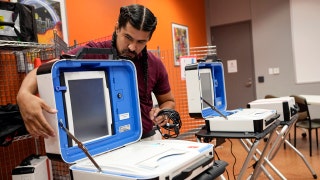NH voter details importance of combating opioid crisis in 2024 election
Hope on Haven Hill Executive Director Kerry Norton joins "Fox & Friends First" to discuss the importance of tackling the opioid crisis as GOP candidates address the critical issue.
FIRST ON FOX: The West Virginia attorney general is calling on the Drug Enforcement Administration (DEA) and the Department of Commerce to explain their decision to limit public access to a "critical" database on opioid provider registrations.
The Controlled Substances Act Registration Information Database, which was previously available to the public, has been restricted since January 2021 to a case-by-case, agency-approved basis only. The database, which was used to provide real-time information about active and retired DEA registrations, is now only accessible to those who can demonstrate a legitimate need for the information after the DEA took ownership of the database from the Commerce Department.
West Virginia Attorney General Patrick Morrisey, who said he has "been deep in the fight" against the opioid crisis, added that he's "deeply troubled" by the decision. "[I]t was an essential tool for pharmacies checking a provider’s registration status before dispensing opioids, as well as for public accountability when it comes to who DEA grants or refuses a registration," he noted in a letter Thursday to Commerce Secretary Gina Raimondo and DEA Administrator Anne Milgram.
"For too long, an ever-growing supply of legal opioids made it too easy for drugs initially obtained through lawful prescriptions to be diverted to illicit – and deadly – ends," Morrisey wrote.
BIDEN ADMIN WILL MOVE TO RECLASSIFY MARIJUANA AS 'LESS DANGEROUS DRUG' IN HISTORIC SHIFT

Republican West Virginia Attorney General Patrick Morrisey (Patrick Smith/Getty Images/File)
"Pulling down the public database came in the wake of my Office’s and the Inspector General’s reports exposing DEA’s repeated failures in fulfilling its statutory duties to the public," Morrisey wrote. "And the database concerns an issue that the Inspector General report specifically called out: DEA’s years long failure to issue enough Immediate Suspension Orders, its ‘strongest enforcement tool ... to stop registrants from diverting prescription drugs.’"
Morrisey noted that the decision comes at a time when opioid-related overdose deaths continue to skyrocket. According to the DEA's website, opioid deaths increased by 38% from Jan. 31, 2020, to Jan. 31, 2021.
West Virginia’s drug overdose mortality has been the highest in the country: 90.9 deaths per 100,000 total population in 2021, according to Morrisey's letter. Nationwide, more than six times as many people died from drug overdoses in 2021 than in 1999, and more than 3 in 4 of those deaths involved opioids, the letter said.
"Each of these realities should have been a reason to increase transparency, not to hide away DEA’s registration decisions from public review," Morrisey wrote.
"Broad access to registration information is critical not just for pharmacies making sure a prescription is legitimate, but for journalists and watchdog advocacy groups holding our government accountable. In short, more eyes on DEA’s registration decisions are vital to make sure DEA is doing its job by denying or suspending registrations for providers who add to the opioid epidemic’s death toll," he continued.

West Virginia Attorney General Patrick Morrisey wrote to DEA Administrator Anne Milgram, shown, to ask about the decision to limit public access to a "critical" database on opioid provider registrations. (Getty Images/File)
Morrisey is demanding answers from DEA and the Commerce Department about why they made this decision, how many applications have been denied, and what criteria are used to issue access to the database. He also urged immediate action to address the concerns and make the information freely available to the public.
The West Virginia Attorney General's Office said it has been investigating the role of federal regulators in allowing excessive overproduction of prescription opioids, which has contributed to the opioid epidemic. Morrisey's office has also been pushing for increased transparency and accountability in the fight against the opioid crisis.
JELLY ROLL GIVES POWERFUL TESTIMONY TO CONGRESS ON FENTANYL: 'I WAS PART OF THE PROBLEM'

A DEA agent looks at posters of fentanyl overdose victims during a National Fentanyl Awareness Day event in New York City on Aug. 21, 2023. (Luiz C. Ribeiro for NY Daily News via Getty Images)
"Agencies should welcome public accountability and I trust they’ll do the right thing," he said in a statement to Fox News Digital.
CLICK HERE TO GET THE FOX NEWS APP
The DEA and Commerce Department did not immediately respond to Fox News Digital’s requests for comment.













































